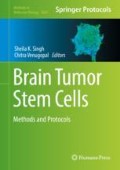Abstract
Early development of human organisms relies on stem cells, a population of non-specialized cells that can divide symmetrically to give rise to two identical daughter cells, or divide asymmetrically to produce one identical daughter cell and another more specialized cell. The capacity to undergo cellular divisions while maintaining an undifferentiated state is termed self-renewal and is responsible for the maintenance of stem cell populations during development. In addition, self-renewal plays a crucial role in the homeostasis of developed organism through replacement of defective cells.
Similar to their non-malignant counterparts, it has been postulated that tumor cells follow a differentiation hierarchy, with the least differentiated cells termed cancer stem cells (CSCs) at the apex. These tumor stem cells possess the ability to self-renew, have a higher capacity to initiate tumor growth when xenografted into an animal model, and can recapitulate the cell heterogeneity of the tumor they originate from. Hence, further investigation of mechanisms governing the self-renewal in cancer can lead to development of novel therapies targeting CSCs.
In this chapter, we described the soft agar assay and the limiting dilution assay (LDA) as two easy-to-implement and inexpensive assays to measure the stemness properties of brain tumor stem cells (BTSCs). These techniques constitute useful tools for the preclinical evaluation of therapeutic strategies targeting BTSCs clonogenicity.
Access this chapter
Tax calculation will be finalised at checkout
Purchases are for personal use only
References
Puck TT, Marcus PI, Cieciura SJ (1956) Clonal growth of mammalian cells in vitro; growth characteristics of colonies from single HeLa cells with and without a feeder layer. J Exp Med 103:273–283
Cieciura SJ, Marcus PI, Puck TT (1956) Clonal growth in vitro of epithelial cells from normal human tissues. J Exp Med 104:615–628
Becker AJ, McCulloch EA, Till JE (1963) Cytological demonstration of the clonal nature of spleen colonies derived from transplanted mouse marrow cells. Nature 197:452–454
Bonnet D, Dick JE (1997) Human acute myeloid leukemia is organized as a hierarchy that originates from a primitive hematopoietic cell. Nat Med 3:730–737
Al-Hajj M, Wicha MS, Benito-Hernandez A et al. (2003) Prospective identification of tumorigenic breast cancer cells. Proc Natl Acad Sci U S A 100:3983–3988
Singh SK, Hawkins C, Clarke ID et al. (2004) Identification of human brain tumour initiating cells. Nature 432:396–401
Reya T, Morrison SJ, Clarke MF, Weissman IL (2001) Stem cells, cancer, and cancer stem cells. Nature 414:105–111
Taddei ML, Giannoni E, Fiaschi T, Chiarugi P (2012) Anoikis: an emerging hallmark in health and diseases. J Pathol 226:380–393
Selby P, Buick RN, Tannock I (1983) A critical appraisal of the “human tumor stem-cell assay”. N Engl J Med 308:129–134
Venugopal C, McFarlane NM, Nolte S et al. (2012) Processing of primary brain tumor tissue for stem cell assays and flow sorting. J Vis Exp (67)
Abbott A (2003) Cell culture: biology’s new dimension. Nature 424:870–872
Hu Y, Smyth GK (2009) ELDA: extreme limiting dilution analysis for comparing depleted and enriched populations in stem cell and other assays. J Immunol Methods 347:70–78
Author information
Authors and Affiliations
Corresponding author
Editor information
Editors and Affiliations
Rights and permissions
Copyright information
© 2019 Springer Science+Business Media, LLC, part of Springer Nature
About this protocol
Cite this protocol
Seyfrid, M., Bobrowski, D., Bakhshinyan, D., Tatari, N., Venugopal, C., Singh, S.K. (2019). In Vitro Self-Renewal Assays for Brain Tumor Stem Cells. In: Singh, S., Venugopal, C. (eds) Brain Tumor Stem Cells. Methods in Molecular Biology, vol 1869. Humana Press, New York, NY. https://doi.org/10.1007/978-1-4939-8805-1_7
Download citation
DOI: https://doi.org/10.1007/978-1-4939-8805-1_7
Published:
Publisher Name: Humana Press, New York, NY
Print ISBN: 978-1-4939-8804-4
Online ISBN: 978-1-4939-8805-1
eBook Packages: Springer Protocols

